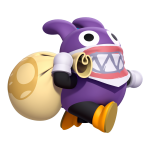The challenges facing Nintendo's Wii U are many, to the extent that the publisher must start to prioritize its efforts to revive the stalled momentum of the system. One result of this prioritization is how Nintendo thinks about third party development. The publisher knows it needs the diversity and strength that aggressive third party support can bring, but also understands that it can't force business partners to a system that isn't selling. First it needs to do its own part."What we need to do is regain the momentum of the Wii U in the marketplace and establish successful examples of third-party Wii U software," Nintendo global president Satoru Iwata told me. "Our focus is, first of all, to regain the momentum of the Wii U towards the end of this year, and then we’ll try to establish successful third-party Wii U software titles. I believe in the importance of third-party support for Nintendo platforms. I’m very willing to change the current situation."
Nintendo of America (NOA) president Reggie Fils-Aime echoes the views of his boss, noting that similar views were held just ahead of launch. What radically shifted third party support then was various publishers seeing reactions to Nintendo's own software, and realizing they might have opportunities of their own. "I’ve had conversations with a number of the publishers," Fils-Aime said. "As they see what we’re doing and the commitment we have with Mario, Donkey Kong, Zelda… As we have behind-the-scenes conversations about what’s further in development and what’s coming down, the decisions around the next lineup of development and where they’re going to put their development dollars are starting to shift."
Fils-Aime wouldn't get into many specifics regarding major third party publishers, though he did attempt to clarify EA's level of support, saying "they do have projects in development... just nothing coming out this fall." Still, the NOA executive did stress that he understands why third parties are waiting, and why support has been anemic thus far.
"Looking at this through the prism of a business decision, if I’m a third-party publisher, what I want is that I want a large, diverse installed base to invest in my development and be able to monetize against that large installed base," Fils-Aime said. "That’s why, from a Nintendo first-party perspective, we have to drive the installed base. We need a diverse group of consumers. Not just core, not just casual, but a broad, diverse group of consumers within that installed base, so that whether you’re Ubi with Assassin’s Creed or with Just Dance, you’re feeling confident that your game is going to find a home. You’ll be able to monetize your development."
It's clear that Nintendo's two lead businessmen clearly understand the situation before them. Their internal teams have not delivered software to push Wii U systems. Though third party support could loosely be defined as a circular chicken-and-egg situation (software sells systems which in term sell software), that premise doesn't exist unless Nintendo itself defines what makes its console, particularly one that attempts to stay outside traditional industry boundaries, worthwhile. And that hasn't happened yet.
Despite the fact that Nintendo knows that it is more or less on its own when it comes to reviving Wii U's momentum, the publisher doesn't view finding third party support as a futile effort. Iwata described a scenario to me which clearly illustrates the necessary role of third party support. Essentially it comes down to this - Nintendo doesn't know how to do everything, and it simply can't do everything.
"If we had an infinite amount of resources, development resources, we might be able to satisfy any and all needs of game players and non-game players all over the world. But our resources are always limited," Iwata said. "The fact of the matter is that there are some areas of game creation that Nintendo is very good at, but there are other things that Nintendo is not very good at. There are huge numbers of fans of Nintendo software, but at the same time, those types of players still sometimes want to play something else on our platform. Because of that, we always need third parties to support us, in order to make our platform complete."
Iwata's description went on to note that third parties can also provide valuable software when Nintendo's own teams need more development time. That certainly would have been welcome in Wii U's initial six months on the market, a half year more defined by a lack of new software than anything else.
One common reaction from Nintendo fans, especially in the face of third party support disappearing or being delayed, is questioning why Nintendo doesn't do more to push third party support. Why let Rayman Legends slip away? Why not financially support EA development? According to Fils-Aime, those conversations are happening constantly. "We have ongoing conversations with publishers about how to support them, how to support their development, how as best as we can to assure that their games are going to do well on our platform," Fils-Aime said. "In the end, independent publishers need to decide what’s going to be best for their companies." In the case of Wii U, with a low install base and a few months before sales will likely receive a much-needed boost, it's clear that Nintendo has its work cut out. Fils-Aime noted that third parties supporting Wii and DS did "exceptionally well financially."
Has Nintendo ever worked this hard to get devs on board before?


















